Entrepreneurship Report: Venture Types, Impact, Traits, and Experience
VerifiedAdded on 2021/01/02
|19
|5598
|386
Report
AI Summary
This report provides a comprehensive overview of entrepreneurship, encompassing various venture types such as small business entrepreneurship, scalable startups, and social entrepreneurship. It delves into the similarities and differences between small and large businesses, as well as social and scalable entrepreneurship. The report assesses the impact of micro and small businesses on the economy using relevant data and statistics, highlighting their role in cash flow and employment generation. It also explores the characteristic traits of successful entrepreneurs, differentiating them from business managers, and examines how entrepreneurial personalities reflect motivation and mindset. Furthermore, the report investigates how background and experience can influence entrepreneurial success, using examples to illustrate the hindering or fostering effects of these factors. The report covers topics like types of entrepreneurial ventures, their impact on the economy, entrepreneurial traits, and the influence of background and experience, offering valuable insights into the multifaceted world of entrepreneurship.

ENTREPRENERUSHIP
Paraphrase This Document
Need a fresh take? Get an instant paraphrase of this document with our AI Paraphraser
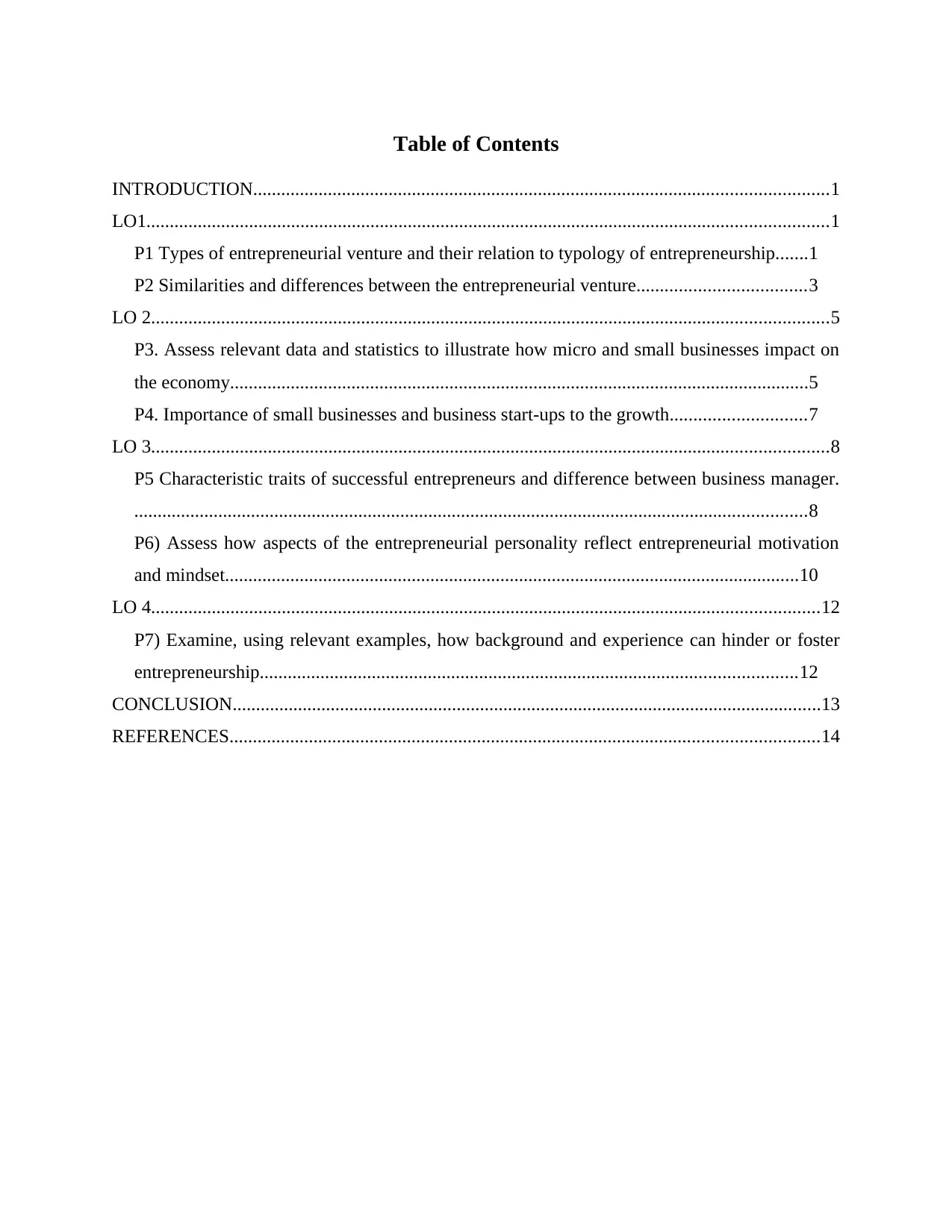
Table of Contents
INTRODUCTION...........................................................................................................................1
LO1..................................................................................................................................................1
P1 Types of entrepreneurial venture and their relation to typology of entrepreneurship.......1
P2 Similarities and differences between the entrepreneurial venture....................................3
LO 2.................................................................................................................................................5
P3. Assess relevant data and statistics to illustrate how micro and small businesses impact on
the economy............................................................................................................................5
P4. Importance of small businesses and business start-ups to the growth.............................7
LO 3.................................................................................................................................................8
P5 Characteristic traits of successful entrepreneurs and difference between business manager.
................................................................................................................................................8
P6) Assess how aspects of the entrepreneurial personality reflect entrepreneurial motivation
and mindset...........................................................................................................................10
LO 4...............................................................................................................................................12
P7) Examine, using relevant examples, how background and experience can hinder or foster
entrepreneurship...................................................................................................................12
CONCLUSION..............................................................................................................................13
REFERENCES..............................................................................................................................14
INTRODUCTION...........................................................................................................................1
LO1..................................................................................................................................................1
P1 Types of entrepreneurial venture and their relation to typology of entrepreneurship.......1
P2 Similarities and differences between the entrepreneurial venture....................................3
LO 2.................................................................................................................................................5
P3. Assess relevant data and statistics to illustrate how micro and small businesses impact on
the economy............................................................................................................................5
P4. Importance of small businesses and business start-ups to the growth.............................7
LO 3.................................................................................................................................................8
P5 Characteristic traits of successful entrepreneurs and difference between business manager.
................................................................................................................................................8
P6) Assess how aspects of the entrepreneurial personality reflect entrepreneurial motivation
and mindset...........................................................................................................................10
LO 4...............................................................................................................................................12
P7) Examine, using relevant examples, how background and experience can hinder or foster
entrepreneurship...................................................................................................................12
CONCLUSION..............................................................................................................................13
REFERENCES..............................................................................................................................14
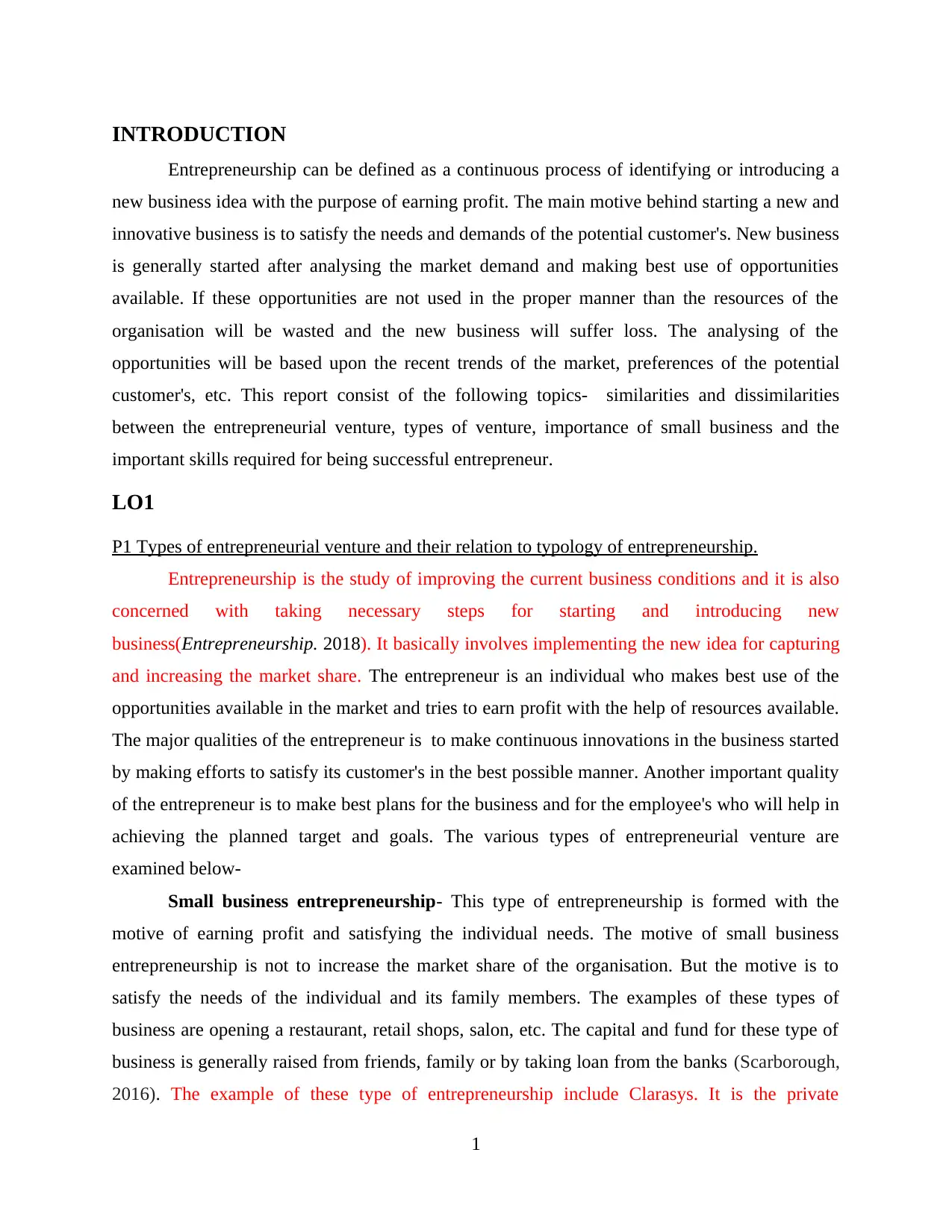
INTRODUCTION
Entrepreneurship can be defined as a continuous process of identifying or introducing a
new business idea with the purpose of earning profit. The main motive behind starting a new and
innovative business is to satisfy the needs and demands of the potential customer's. New business
is generally started after analysing the market demand and making best use of opportunities
available. If these opportunities are not used in the proper manner than the resources of the
organisation will be wasted and the new business will suffer loss. The analysing of the
opportunities will be based upon the recent trends of the market, preferences of the potential
customer's, etc. This report consist of the following topics- similarities and dissimilarities
between the entrepreneurial venture, types of venture, importance of small business and the
important skills required for being successful entrepreneur.
LO1
P1 Types of entrepreneurial venture and their relation to typology of entrepreneurship.
Entrepreneurship is the study of improving the current business conditions and it is also
concerned with taking necessary steps for starting and introducing new
business(Entrepreneurship. 2018). It basically involves implementing the new idea for capturing
and increasing the market share. The entrepreneur is an individual who makes best use of the
opportunities available in the market and tries to earn profit with the help of resources available.
The major qualities of the entrepreneur is to make continuous innovations in the business started
by making efforts to satisfy its customer's in the best possible manner. Another important quality
of the entrepreneur is to make best plans for the business and for the employee's who will help in
achieving the planned target and goals. The various types of entrepreneurial venture are
examined below-
Small business entrepreneurship- This type of entrepreneurship is formed with the
motive of earning profit and satisfying the individual needs. The motive of small business
entrepreneurship is not to increase the market share of the organisation. But the motive is to
satisfy the needs of the individual and its family members. The examples of these types of
business are opening a restaurant, retail shops, salon, etc. The capital and fund for these type of
business is generally raised from friends, family or by taking loan from the banks (Scarborough,
2016). The example of these type of entrepreneurship include Clarasys. It is the private
1
Entrepreneurship can be defined as a continuous process of identifying or introducing a
new business idea with the purpose of earning profit. The main motive behind starting a new and
innovative business is to satisfy the needs and demands of the potential customer's. New business
is generally started after analysing the market demand and making best use of opportunities
available. If these opportunities are not used in the proper manner than the resources of the
organisation will be wasted and the new business will suffer loss. The analysing of the
opportunities will be based upon the recent trends of the market, preferences of the potential
customer's, etc. This report consist of the following topics- similarities and dissimilarities
between the entrepreneurial venture, types of venture, importance of small business and the
important skills required for being successful entrepreneur.
LO1
P1 Types of entrepreneurial venture and their relation to typology of entrepreneurship.
Entrepreneurship is the study of improving the current business conditions and it is also
concerned with taking necessary steps for starting and introducing new
business(Entrepreneurship. 2018). It basically involves implementing the new idea for capturing
and increasing the market share. The entrepreneur is an individual who makes best use of the
opportunities available in the market and tries to earn profit with the help of resources available.
The major qualities of the entrepreneur is to make continuous innovations in the business started
by making efforts to satisfy its customer's in the best possible manner. Another important quality
of the entrepreneur is to make best plans for the business and for the employee's who will help in
achieving the planned target and goals. The various types of entrepreneurial venture are
examined below-
Small business entrepreneurship- This type of entrepreneurship is formed with the
motive of earning profit and satisfying the individual needs. The motive of small business
entrepreneurship is not to increase the market share of the organisation. But the motive is to
satisfy the needs of the individual and its family members. The examples of these types of
business are opening a restaurant, retail shops, salon, etc. The capital and fund for these type of
business is generally raised from friends, family or by taking loan from the banks (Scarborough,
2016). The example of these type of entrepreneurship include Clarasys. It is the private
1
⊘ This is a preview!⊘
Do you want full access?
Subscribe today to unlock all pages.

Trusted by 1+ million students worldwide
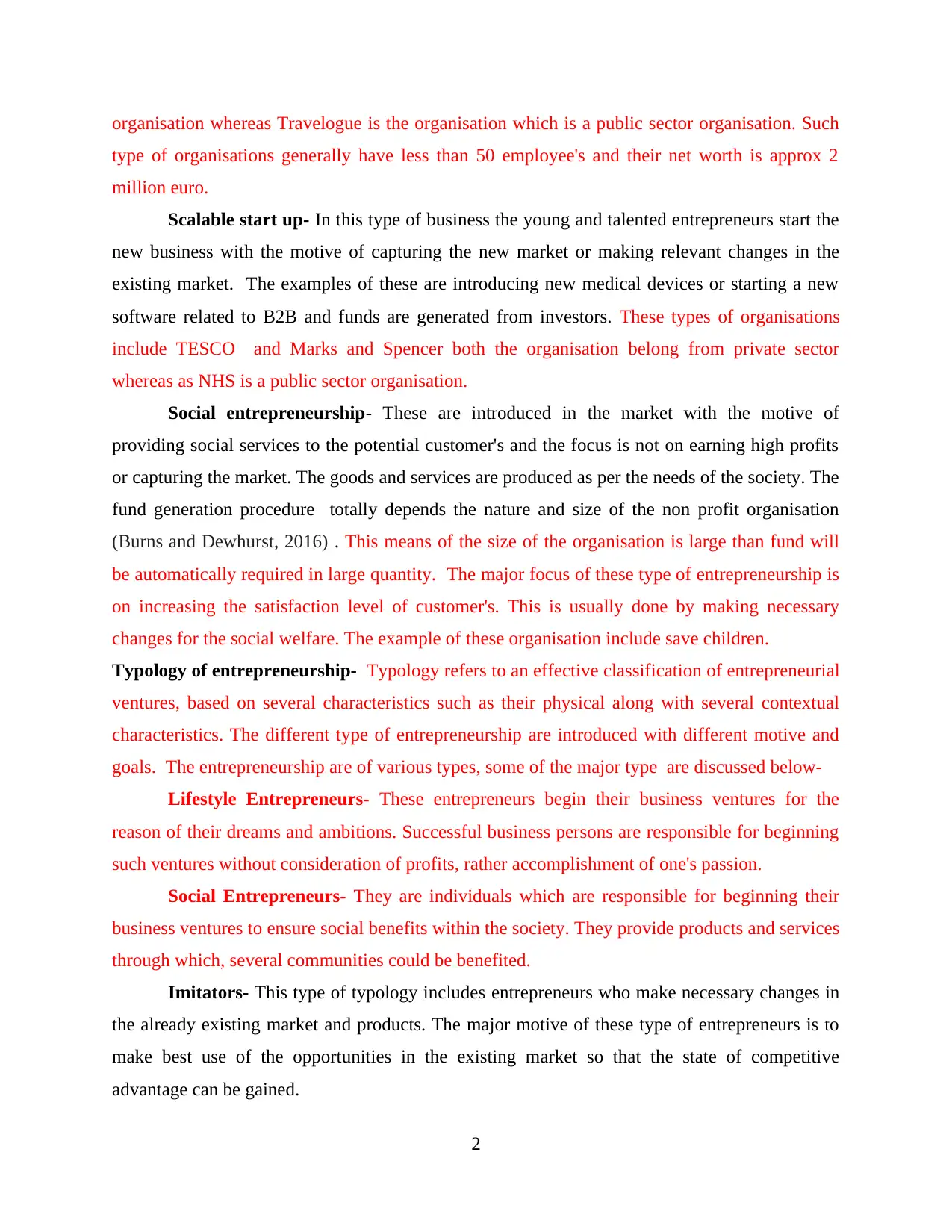
organisation whereas Travelogue is the organisation which is a public sector organisation. Such
type of organisations generally have less than 50 employee's and their net worth is approx 2
million euro.
Scalable start up- In this type of business the young and talented entrepreneurs start the
new business with the motive of capturing the new market or making relevant changes in the
existing market. The examples of these are introducing new medical devices or starting a new
software related to B2B and funds are generated from investors. These types of organisations
include TESCO and Marks and Spencer both the organisation belong from private sector
whereas as NHS is a public sector organisation.
Social entrepreneurship- These are introduced in the market with the motive of
providing social services to the potential customer's and the focus is not on earning high profits
or capturing the market. The goods and services are produced as per the needs of the society. The
fund generation procedure totally depends the nature and size of the non profit organisation
(Burns and Dewhurst, 2016) . This means of the size of the organisation is large than fund will
be automatically required in large quantity. The major focus of these type of entrepreneurship is
on increasing the satisfaction level of customer's. This is usually done by making necessary
changes for the social welfare. The example of these organisation include save children.
Typology of entrepreneurship- Typology refers to an effective classification of entrepreneurial
ventures, based on several characteristics such as their physical along with several contextual
characteristics. The different type of entrepreneurship are introduced with different motive and
goals. The entrepreneurship are of various types, some of the major type are discussed below-
Lifestyle Entrepreneurs- These entrepreneurs begin their business ventures for the
reason of their dreams and ambitions. Successful business persons are responsible for beginning
such ventures without consideration of profits, rather accomplishment of one's passion.
Social Entrepreneurs- They are individuals which are responsible for beginning their
business ventures to ensure social benefits within the society. They provide products and services
through which, several communities could be benefited.
Imitators- This type of typology includes entrepreneurs who make necessary changes in
the already existing market and products. The major motive of these type of entrepreneurs is to
make best use of the opportunities in the existing market so that the state of competitive
advantage can be gained.
2
type of organisations generally have less than 50 employee's and their net worth is approx 2
million euro.
Scalable start up- In this type of business the young and talented entrepreneurs start the
new business with the motive of capturing the new market or making relevant changes in the
existing market. The examples of these are introducing new medical devices or starting a new
software related to B2B and funds are generated from investors. These types of organisations
include TESCO and Marks and Spencer both the organisation belong from private sector
whereas as NHS is a public sector organisation.
Social entrepreneurship- These are introduced in the market with the motive of
providing social services to the potential customer's and the focus is not on earning high profits
or capturing the market. The goods and services are produced as per the needs of the society. The
fund generation procedure totally depends the nature and size of the non profit organisation
(Burns and Dewhurst, 2016) . This means of the size of the organisation is large than fund will
be automatically required in large quantity. The major focus of these type of entrepreneurship is
on increasing the satisfaction level of customer's. This is usually done by making necessary
changes for the social welfare. The example of these organisation include save children.
Typology of entrepreneurship- Typology refers to an effective classification of entrepreneurial
ventures, based on several characteristics such as their physical along with several contextual
characteristics. The different type of entrepreneurship are introduced with different motive and
goals. The entrepreneurship are of various types, some of the major type are discussed below-
Lifestyle Entrepreneurs- These entrepreneurs begin their business ventures for the
reason of their dreams and ambitions. Successful business persons are responsible for beginning
such ventures without consideration of profits, rather accomplishment of one's passion.
Social Entrepreneurs- They are individuals which are responsible for beginning their
business ventures to ensure social benefits within the society. They provide products and services
through which, several communities could be benefited.
Imitators- This type of typology includes entrepreneurs who make necessary changes in
the already existing market and products. The major motive of these type of entrepreneurs is to
make best use of the opportunities in the existing market so that the state of competitive
advantage can be gained.
2
Paraphrase This Document
Need a fresh take? Get an instant paraphrase of this document with our AI Paraphraser
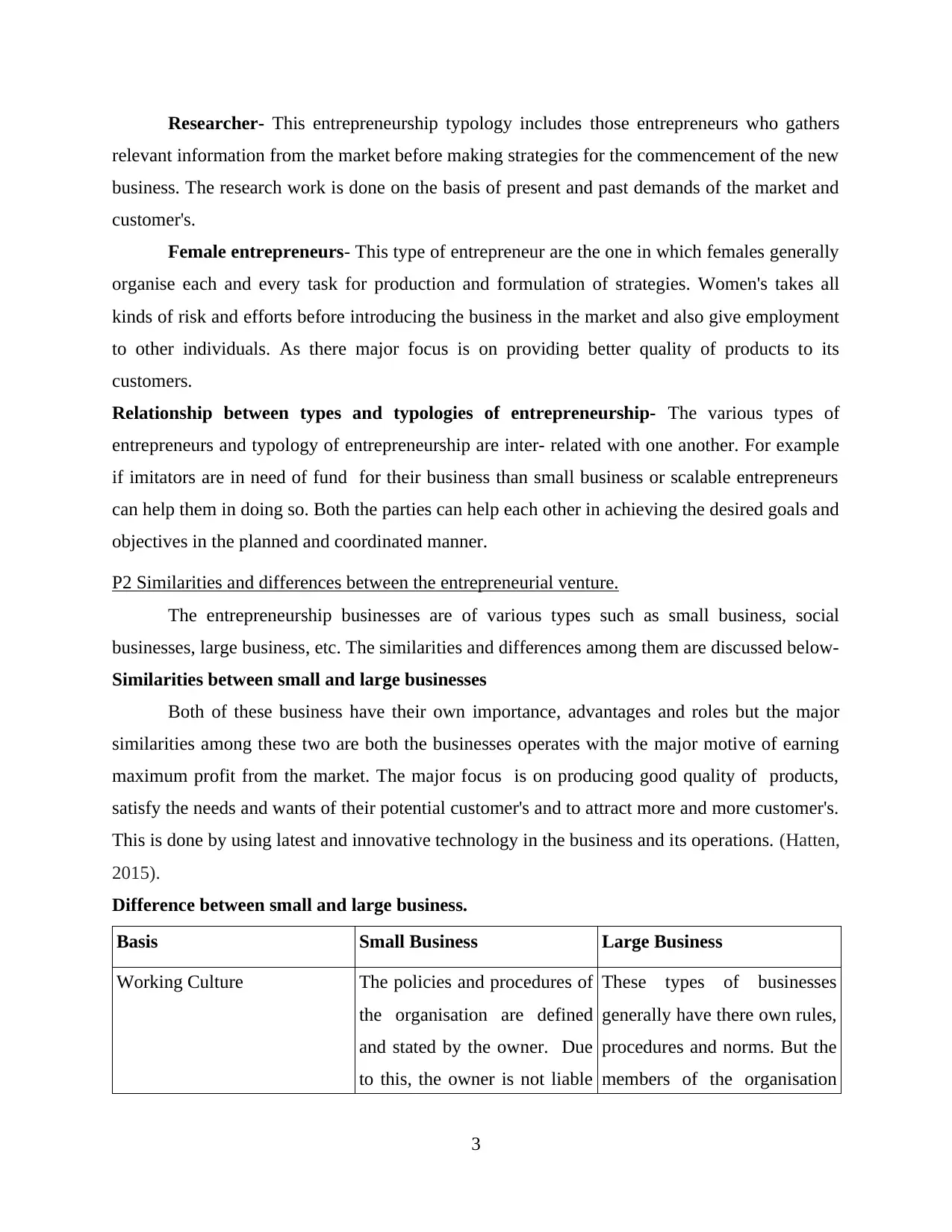
Researcher- This entrepreneurship typology includes those entrepreneurs who gathers
relevant information from the market before making strategies for the commencement of the new
business. The research work is done on the basis of present and past demands of the market and
customer's.
Female entrepreneurs- This type of entrepreneur are the one in which females generally
organise each and every task for production and formulation of strategies. Women's takes all
kinds of risk and efforts before introducing the business in the market and also give employment
to other individuals. As there major focus is on providing better quality of products to its
customers.
Relationship between types and typologies of entrepreneurship- The various types of
entrepreneurs and typology of entrepreneurship are inter- related with one another. For example
if imitators are in need of fund for their business than small business or scalable entrepreneurs
can help them in doing so. Both the parties can help each other in achieving the desired goals and
objectives in the planned and coordinated manner.
P2 Similarities and differences between the entrepreneurial venture.
The entrepreneurship businesses are of various types such as small business, social
businesses, large business, etc. The similarities and differences among them are discussed below-
Similarities between small and large businesses
Both of these business have their own importance, advantages and roles but the major
similarities among these two are both the businesses operates with the major motive of earning
maximum profit from the market. The major focus is on producing good quality of products,
satisfy the needs and wants of their potential customer's and to attract more and more customer's.
This is done by using latest and innovative technology in the business and its operations. (Hatten,
2015).
Difference between small and large business.
Basis Small Business Large Business
Working Culture The policies and procedures of
the organisation are defined
and stated by the owner. Due
to this, the owner is not liable
These types of businesses
generally have there own rules,
procedures and norms. But the
members of the organisation
3
relevant information from the market before making strategies for the commencement of the new
business. The research work is done on the basis of present and past demands of the market and
customer's.
Female entrepreneurs- This type of entrepreneur are the one in which females generally
organise each and every task for production and formulation of strategies. Women's takes all
kinds of risk and efforts before introducing the business in the market and also give employment
to other individuals. As there major focus is on providing better quality of products to its
customers.
Relationship between types and typologies of entrepreneurship- The various types of
entrepreneurs and typology of entrepreneurship are inter- related with one another. For example
if imitators are in need of fund for their business than small business or scalable entrepreneurs
can help them in doing so. Both the parties can help each other in achieving the desired goals and
objectives in the planned and coordinated manner.
P2 Similarities and differences between the entrepreneurial venture.
The entrepreneurship businesses are of various types such as small business, social
businesses, large business, etc. The similarities and differences among them are discussed below-
Similarities between small and large businesses
Both of these business have their own importance, advantages and roles but the major
similarities among these two are both the businesses operates with the major motive of earning
maximum profit from the market. The major focus is on producing good quality of products,
satisfy the needs and wants of their potential customer's and to attract more and more customer's.
This is done by using latest and innovative technology in the business and its operations. (Hatten,
2015).
Difference between small and large business.
Basis Small Business Large Business
Working Culture The policies and procedures of
the organisation are defined
and stated by the owner. Due
to this, the owner is not liable
These types of businesses
generally have there own rules,
procedures and norms. But the
members of the organisation
3
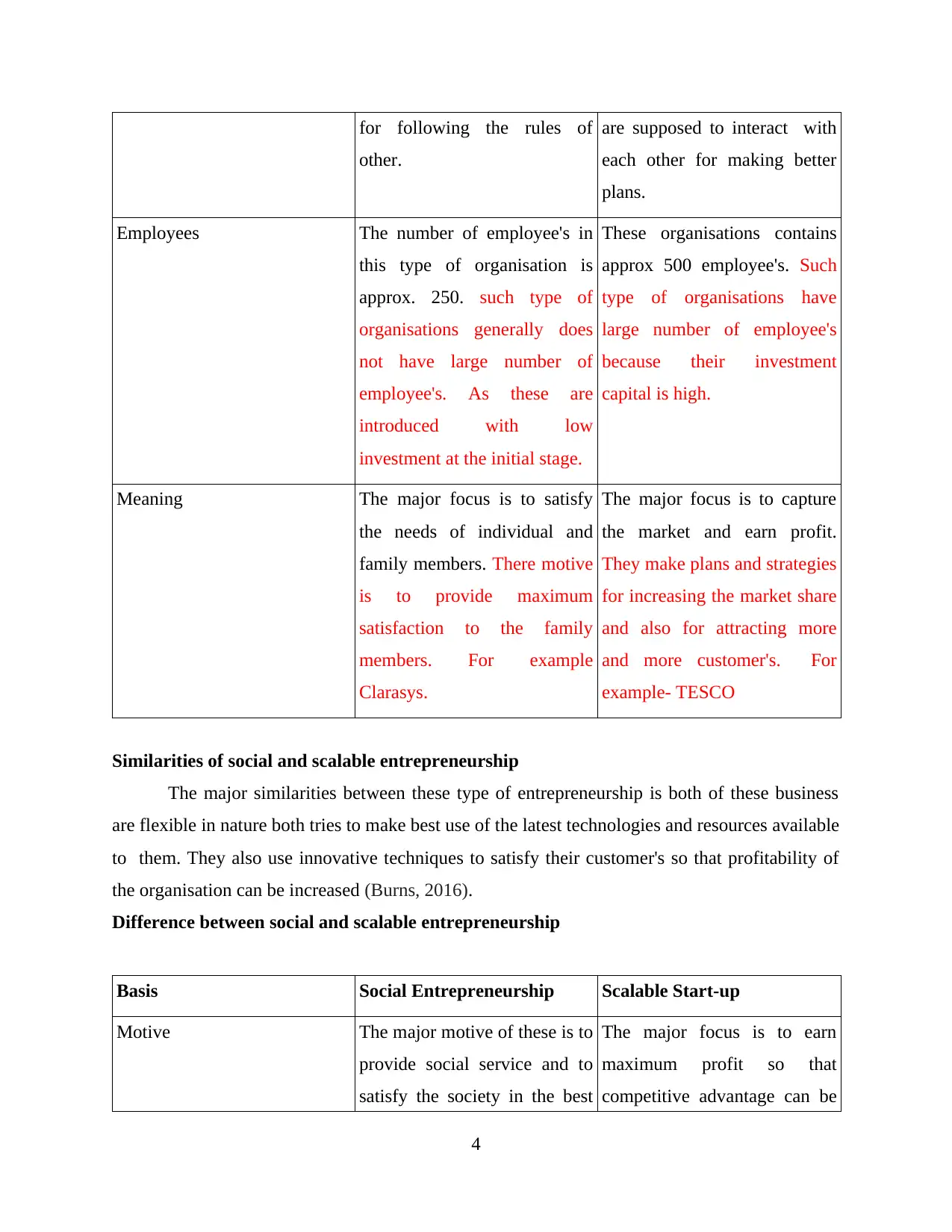
for following the rules of
other.
are supposed to interact with
each other for making better
plans.
Employees The number of employee's in
this type of organisation is
approx. 250. such type of
organisations generally does
not have large number of
employee's. As these are
introduced with low
investment at the initial stage.
These organisations contains
approx 500 employee's. Such
type of organisations have
large number of employee's
because their investment
capital is high.
Meaning The major focus is to satisfy
the needs of individual and
family members. There motive
is to provide maximum
satisfaction to the family
members. For example
Clarasys.
The major focus is to capture
the market and earn profit.
They make plans and strategies
for increasing the market share
and also for attracting more
and more customer's. For
example- TESCO
Similarities of social and scalable entrepreneurship
The major similarities between these type of entrepreneurship is both of these business
are flexible in nature both tries to make best use of the latest technologies and resources available
to them. They also use innovative techniques to satisfy their customer's so that profitability of
the organisation can be increased (Burns, 2016).
Difference between social and scalable entrepreneurship
Basis Social Entrepreneurship Scalable Start-up
Motive The major motive of these is to
provide social service and to
satisfy the society in the best
The major focus is to earn
maximum profit so that
competitive advantage can be
4
other.
are supposed to interact with
each other for making better
plans.
Employees The number of employee's in
this type of organisation is
approx. 250. such type of
organisations generally does
not have large number of
employee's. As these are
introduced with low
investment at the initial stage.
These organisations contains
approx 500 employee's. Such
type of organisations have
large number of employee's
because their investment
capital is high.
Meaning The major focus is to satisfy
the needs of individual and
family members. There motive
is to provide maximum
satisfaction to the family
members. For example
Clarasys.
The major focus is to capture
the market and earn profit.
They make plans and strategies
for increasing the market share
and also for attracting more
and more customer's. For
example- TESCO
Similarities of social and scalable entrepreneurship
The major similarities between these type of entrepreneurship is both of these business
are flexible in nature both tries to make best use of the latest technologies and resources available
to them. They also use innovative techniques to satisfy their customer's so that profitability of
the organisation can be increased (Burns, 2016).
Difference between social and scalable entrepreneurship
Basis Social Entrepreneurship Scalable Start-up
Motive The major motive of these is to
provide social service and to
satisfy the society in the best
The major focus is to earn
maximum profit so that
competitive advantage can be
4
⊘ This is a preview!⊘
Do you want full access?
Subscribe today to unlock all pages.

Trusted by 1+ million students worldwide
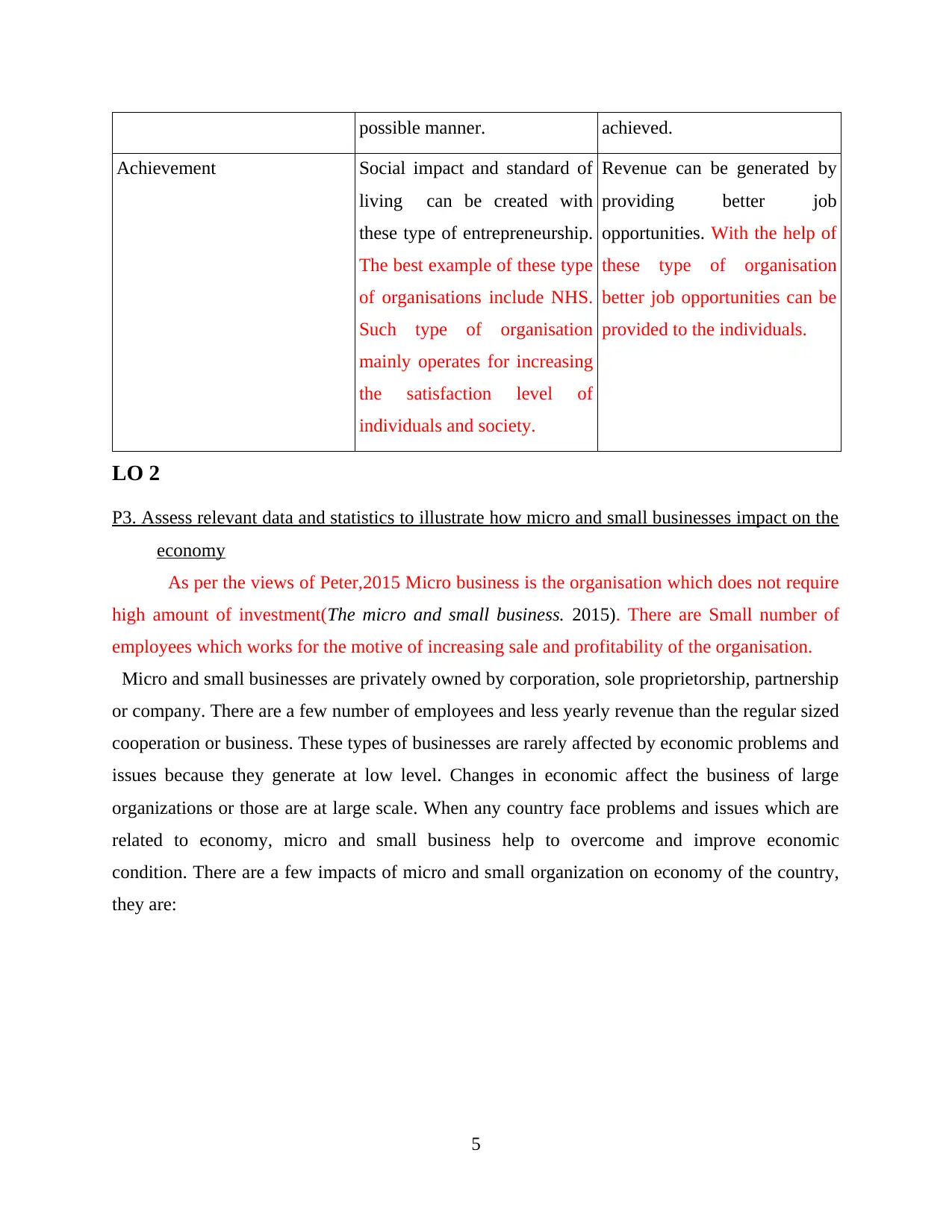
possible manner. achieved.
Achievement Social impact and standard of
living can be created with
these type of entrepreneurship.
The best example of these type
of organisations include NHS.
Such type of organisation
mainly operates for increasing
the satisfaction level of
individuals and society.
Revenue can be generated by
providing better job
opportunities. With the help of
these type of organisation
better job opportunities can be
provided to the individuals.
LO 2
P3. Assess relevant data and statistics to illustrate how micro and small businesses impact on the
economy
As per the views of Peter,2015 Micro business is the organisation which does not require
high amount of investment(The micro and small business. 2015). There are Small number of
employees which works for the motive of increasing sale and profitability of the organisation.
Micro and small businesses are privately owned by corporation, sole proprietorship, partnership
or company. There are a few number of employees and less yearly revenue than the regular sized
cooperation or business. These types of businesses are rarely affected by economic problems and
issues because they generate at low level. Changes in economic affect the business of large
organizations or those are at large scale. When any country face problems and issues which are
related to economy, micro and small business help to overcome and improve economic
condition. There are a few impacts of micro and small organization on economy of the country,
they are:
5
Achievement Social impact and standard of
living can be created with
these type of entrepreneurship.
The best example of these type
of organisations include NHS.
Such type of organisation
mainly operates for increasing
the satisfaction level of
individuals and society.
Revenue can be generated by
providing better job
opportunities. With the help of
these type of organisation
better job opportunities can be
provided to the individuals.
LO 2
P3. Assess relevant data and statistics to illustrate how micro and small businesses impact on the
economy
As per the views of Peter,2015 Micro business is the organisation which does not require
high amount of investment(The micro and small business. 2015). There are Small number of
employees which works for the motive of increasing sale and profitability of the organisation.
Micro and small businesses are privately owned by corporation, sole proprietorship, partnership
or company. There are a few number of employees and less yearly revenue than the regular sized
cooperation or business. These types of businesses are rarely affected by economic problems and
issues because they generate at low level. Changes in economic affect the business of large
organizations or those are at large scale. When any country face problems and issues which are
related to economy, micro and small business help to overcome and improve economic
condition. There are a few impacts of micro and small organization on economy of the country,
they are:
5
Paraphrase This Document
Need a fresh take? Get an instant paraphrase of this document with our AI Paraphraser
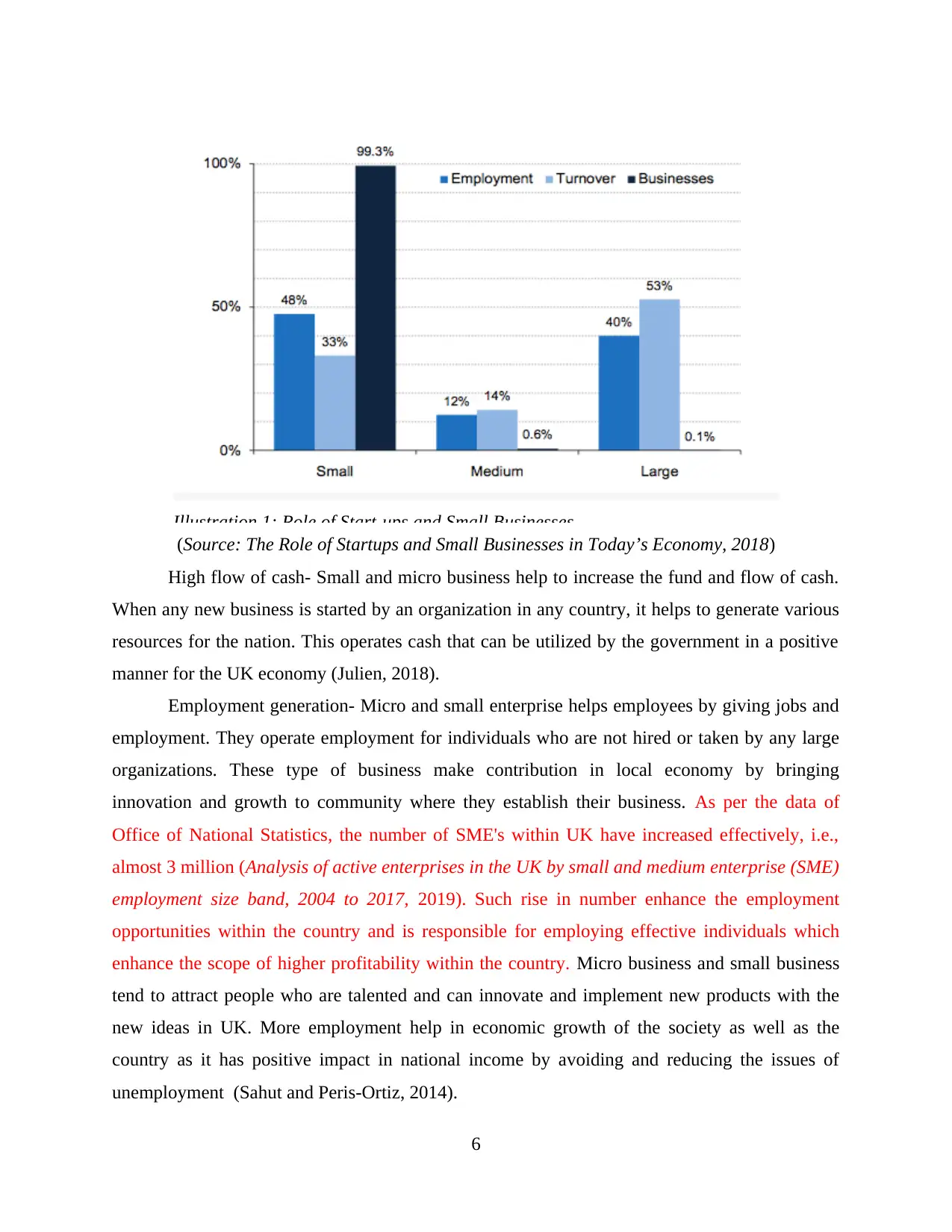
(Source: The Role of Startups and Small Businesses in Today’s Economy, 2018)
High flow of cash- Small and micro business help to increase the fund and flow of cash.
When any new business is started by an organization in any country, it helps to generate various
resources for the nation. This operates cash that can be utilized by the government in a positive
manner for the UK economy (Julien, 2018).
Employment generation- Micro and small enterprise helps employees by giving jobs and
employment. They operate employment for individuals who are not hired or taken by any large
organizations. These type of business make contribution in local economy by bringing
innovation and growth to community where they establish their business. As per the data of
Office of National Statistics, the number of SME's within UK have increased effectively, i.e.,
almost 3 million (Analysis of active enterprises in the UK by small and medium enterprise (SME)
employment size band, 2004 to 2017, 2019). Such rise in number enhance the employment
opportunities within the country and is responsible for employing effective individuals which
enhance the scope of higher profitability within the country. Micro business and small business
tend to attract people who are talented and can innovate and implement new products with the
new ideas in UK. More employment help in economic growth of the society as well as the
country as it has positive impact in national income by avoiding and reducing the issues of
unemployment (Sahut and Peris-Ortiz, 2014).
6
Illustration 1: Role of Start-ups and Small Businesses
High flow of cash- Small and micro business help to increase the fund and flow of cash.
When any new business is started by an organization in any country, it helps to generate various
resources for the nation. This operates cash that can be utilized by the government in a positive
manner for the UK economy (Julien, 2018).
Employment generation- Micro and small enterprise helps employees by giving jobs and
employment. They operate employment for individuals who are not hired or taken by any large
organizations. These type of business make contribution in local economy by bringing
innovation and growth to community where they establish their business. As per the data of
Office of National Statistics, the number of SME's within UK have increased effectively, i.e.,
almost 3 million (Analysis of active enterprises in the UK by small and medium enterprise (SME)
employment size band, 2004 to 2017, 2019). Such rise in number enhance the employment
opportunities within the country and is responsible for employing effective individuals which
enhance the scope of higher profitability within the country. Micro business and small business
tend to attract people who are talented and can innovate and implement new products with the
new ideas in UK. More employment help in economic growth of the society as well as the
country as it has positive impact in national income by avoiding and reducing the issues of
unemployment (Sahut and Peris-Ortiz, 2014).
6
Illustration 1: Role of Start-ups and Small Businesses
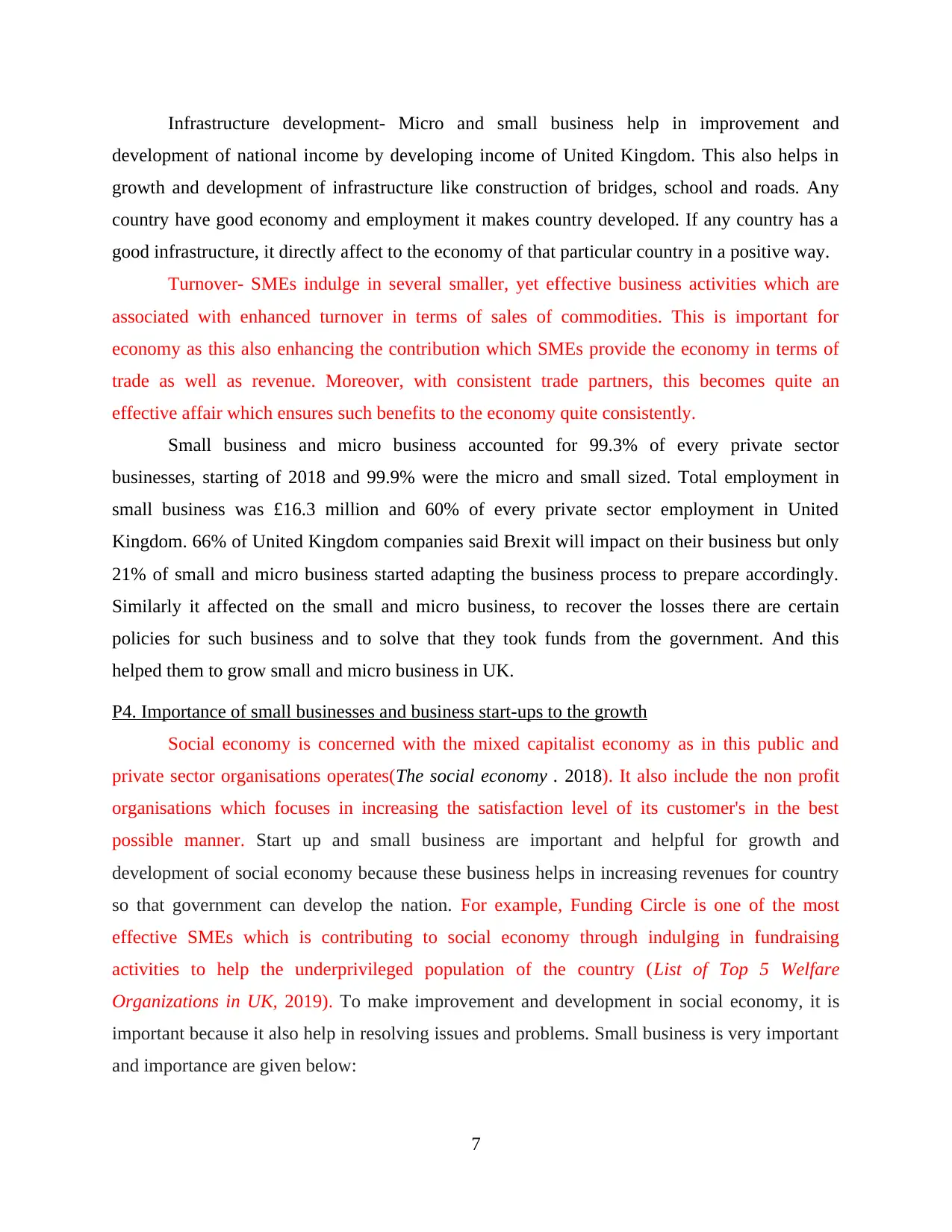
Infrastructure development- Micro and small business help in improvement and
development of national income by developing income of United Kingdom. This also helps in
growth and development of infrastructure like construction of bridges, school and roads. Any
country have good economy and employment it makes country developed. If any country has a
good infrastructure, it directly affect to the economy of that particular country in a positive way.
Turnover- SMEs indulge in several smaller, yet effective business activities which are
associated with enhanced turnover in terms of sales of commodities. This is important for
economy as this also enhancing the contribution which SMEs provide the economy in terms of
trade as well as revenue. Moreover, with consistent trade partners, this becomes quite an
effective affair which ensures such benefits to the economy quite consistently.
Small business and micro business accounted for 99.3% of every private sector
businesses, starting of 2018 and 99.9% were the micro and small sized. Total employment in
small business was £16.3 million and 60% of every private sector employment in United
Kingdom. 66% of United Kingdom companies said Brexit will impact on their business but only
21% of small and micro business started adapting the business process to prepare accordingly.
Similarly it affected on the small and micro business, to recover the losses there are certain
policies for such business and to solve that they took funds from the government. And this
helped them to grow small and micro business in UK.
P4. Importance of small businesses and business start-ups to the growth
Social economy is concerned with the mixed capitalist economy as in this public and
private sector organisations operates(The social economy . 2018). It also include the non profit
organisations which focuses in increasing the satisfaction level of its customer's in the best
possible manner. Start up and small business are important and helpful for growth and
development of social economy because these business helps in increasing revenues for country
so that government can develop the nation. For example, Funding Circle is one of the most
effective SMEs which is contributing to social economy through indulging in fundraising
activities to help the underprivileged population of the country (List of Top 5 Welfare
Organizations in UK, 2019). To make improvement and development in social economy, it is
important because it also help in resolving issues and problems. Small business is very important
and importance are given below:
7
development of national income by developing income of United Kingdom. This also helps in
growth and development of infrastructure like construction of bridges, school and roads. Any
country have good economy and employment it makes country developed. If any country has a
good infrastructure, it directly affect to the economy of that particular country in a positive way.
Turnover- SMEs indulge in several smaller, yet effective business activities which are
associated with enhanced turnover in terms of sales of commodities. This is important for
economy as this also enhancing the contribution which SMEs provide the economy in terms of
trade as well as revenue. Moreover, with consistent trade partners, this becomes quite an
effective affair which ensures such benefits to the economy quite consistently.
Small business and micro business accounted for 99.3% of every private sector
businesses, starting of 2018 and 99.9% were the micro and small sized. Total employment in
small business was £16.3 million and 60% of every private sector employment in United
Kingdom. 66% of United Kingdom companies said Brexit will impact on their business but only
21% of small and micro business started adapting the business process to prepare accordingly.
Similarly it affected on the small and micro business, to recover the losses there are certain
policies for such business and to solve that they took funds from the government. And this
helped them to grow small and micro business in UK.
P4. Importance of small businesses and business start-ups to the growth
Social economy is concerned with the mixed capitalist economy as in this public and
private sector organisations operates(The social economy . 2018). It also include the non profit
organisations which focuses in increasing the satisfaction level of its customer's in the best
possible manner. Start up and small business are important and helpful for growth and
development of social economy because these business helps in increasing revenues for country
so that government can develop the nation. For example, Funding Circle is one of the most
effective SMEs which is contributing to social economy through indulging in fundraising
activities to help the underprivileged population of the country (List of Top 5 Welfare
Organizations in UK, 2019). To make improvement and development in social economy, it is
important because it also help in resolving issues and problems. Small business is very important
and importance are given below:
7
⊘ This is a preview!⊘
Do you want full access?
Subscribe today to unlock all pages.

Trusted by 1+ million students worldwide
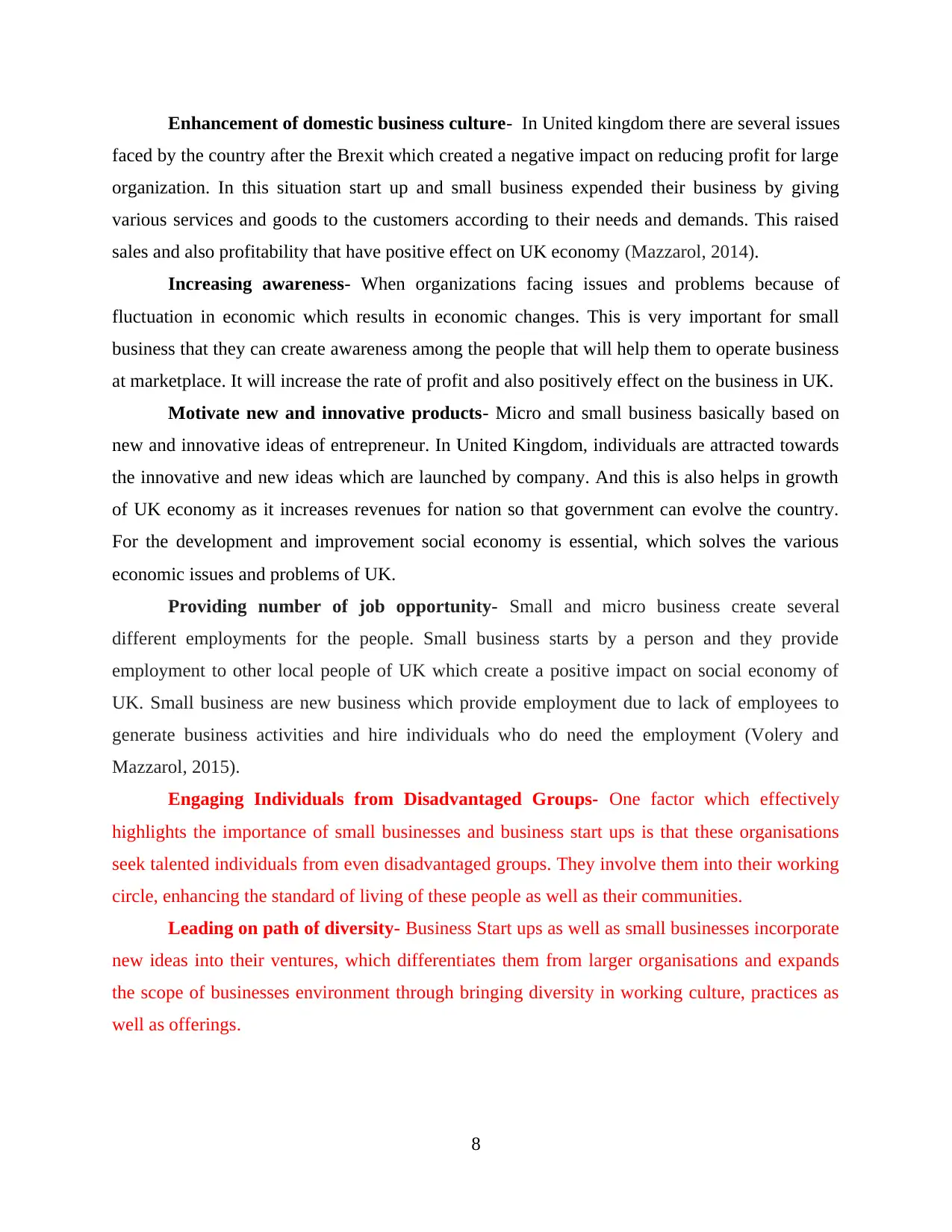
Enhancement of domestic business culture- In United kingdom there are several issues
faced by the country after the Brexit which created a negative impact on reducing profit for large
organization. In this situation start up and small business expended their business by giving
various services and goods to the customers according to their needs and demands. This raised
sales and also profitability that have positive effect on UK economy (Mazzarol, 2014).
Increasing awareness- When organizations facing issues and problems because of
fluctuation in economic which results in economic changes. This is very important for small
business that they can create awareness among the people that will help them to operate business
at marketplace. It will increase the rate of profit and also positively effect on the business in UK.
Motivate new and innovative products- Micro and small business basically based on
new and innovative ideas of entrepreneur. In United Kingdom, individuals are attracted towards
the innovative and new ideas which are launched by company. And this is also helps in growth
of UK economy as it increases revenues for nation so that government can evolve the country.
For the development and improvement social economy is essential, which solves the various
economic issues and problems of UK.
Providing number of job opportunity- Small and micro business create several
different employments for the people. Small business starts by a person and they provide
employment to other local people of UK which create a positive impact on social economy of
UK. Small business are new business which provide employment due to lack of employees to
generate business activities and hire individuals who do need the employment (Volery and
Mazzarol, 2015).
Engaging Individuals from Disadvantaged Groups- One factor which effectively
highlights the importance of small businesses and business start ups is that these organisations
seek talented individuals from even disadvantaged groups. They involve them into their working
circle, enhancing the standard of living of these people as well as their communities.
Leading on path of diversity- Business Start ups as well as small businesses incorporate
new ideas into their ventures, which differentiates them from larger organisations and expands
the scope of businesses environment through bringing diversity in working culture, practices as
well as offerings.
8
faced by the country after the Brexit which created a negative impact on reducing profit for large
organization. In this situation start up and small business expended their business by giving
various services and goods to the customers according to their needs and demands. This raised
sales and also profitability that have positive effect on UK economy (Mazzarol, 2014).
Increasing awareness- When organizations facing issues and problems because of
fluctuation in economic which results in economic changes. This is very important for small
business that they can create awareness among the people that will help them to operate business
at marketplace. It will increase the rate of profit and also positively effect on the business in UK.
Motivate new and innovative products- Micro and small business basically based on
new and innovative ideas of entrepreneur. In United Kingdom, individuals are attracted towards
the innovative and new ideas which are launched by company. And this is also helps in growth
of UK economy as it increases revenues for nation so that government can evolve the country.
For the development and improvement social economy is essential, which solves the various
economic issues and problems of UK.
Providing number of job opportunity- Small and micro business create several
different employments for the people. Small business starts by a person and they provide
employment to other local people of UK which create a positive impact on social economy of
UK. Small business are new business which provide employment due to lack of employees to
generate business activities and hire individuals who do need the employment (Volery and
Mazzarol, 2015).
Engaging Individuals from Disadvantaged Groups- One factor which effectively
highlights the importance of small businesses and business start ups is that these organisations
seek talented individuals from even disadvantaged groups. They involve them into their working
circle, enhancing the standard of living of these people as well as their communities.
Leading on path of diversity- Business Start ups as well as small businesses incorporate
new ideas into their ventures, which differentiates them from larger organisations and expands
the scope of businesses environment through bringing diversity in working culture, practices as
well as offerings.
8
Paraphrase This Document
Need a fresh take? Get an instant paraphrase of this document with our AI Paraphraser

LO 3
P5 Characteristic traits of successful entrepreneurs and difference between business manager.
Entrepreneurs and business managers are very much different because both of them have
to deal with different problems in the organisation. The major difference between entrepreneurs
and business managers are discussed below-
9
P5 Characteristic traits of successful entrepreneurs and difference between business manager.
Entrepreneurs and business managers are very much different because both of them have
to deal with different problems in the organisation. The major difference between entrepreneurs
and business managers are discussed below-
9
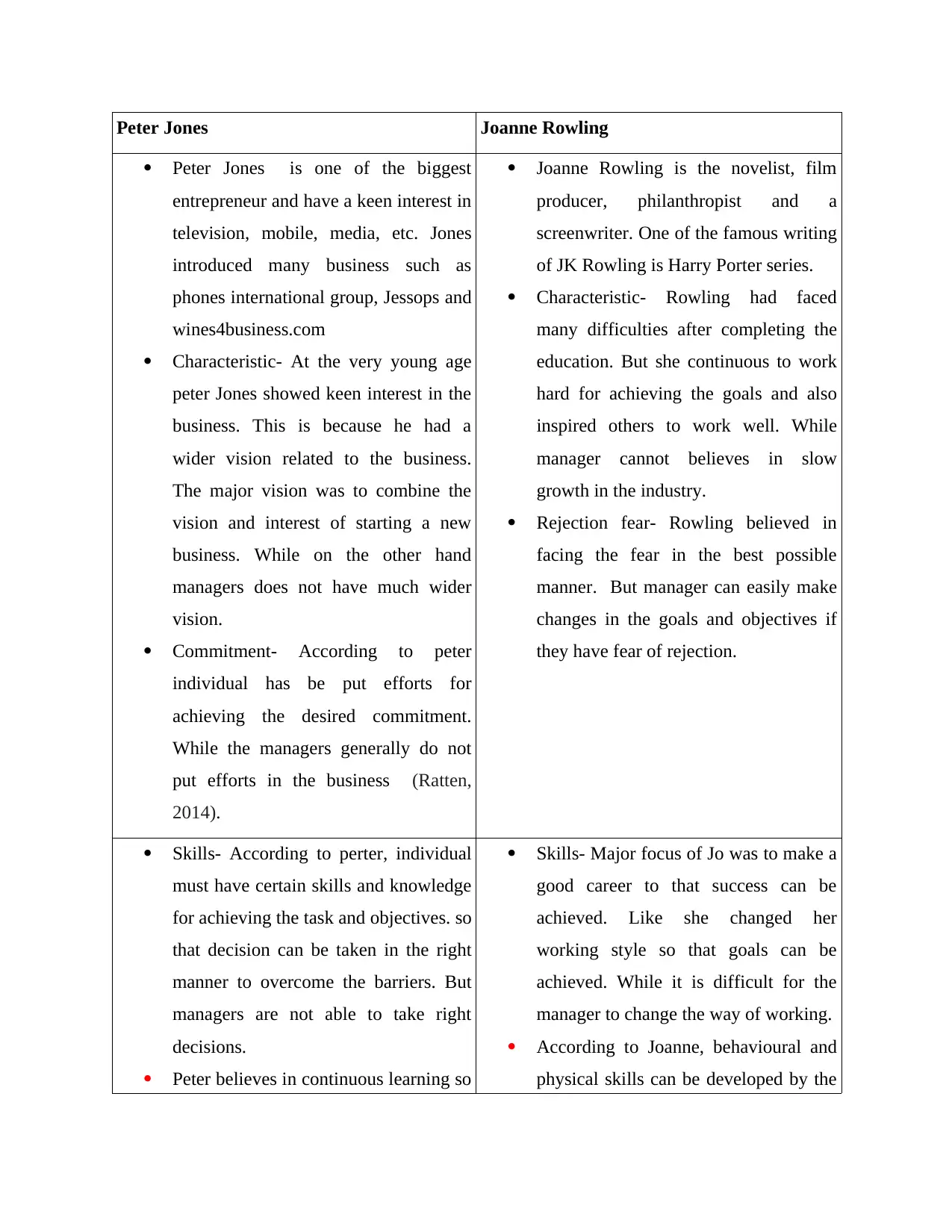
Peter Jones Joanne Rowling
Peter Jones is one of the biggest
entrepreneur and have a keen interest in
television, mobile, media, etc. Jones
introduced many business such as
phones international group, Jessops and
wines4business.com
Characteristic- At the very young age
peter Jones showed keen interest in the
business. This is because he had a
wider vision related to the business.
The major vision was to combine the
vision and interest of starting a new
business. While on the other hand
managers does not have much wider
vision.
Commitment- According to peter
individual has be put efforts for
achieving the desired commitment.
While the managers generally do not
put efforts in the business (Ratten,
2014).
Joanne Rowling is the novelist, film
producer, philanthropist and a
screenwriter. One of the famous writing
of JK Rowling is Harry Porter series.
Characteristic- Rowling had faced
many difficulties after completing the
education. But she continuous to work
hard for achieving the goals and also
inspired others to work well. While
manager cannot believes in slow
growth in the industry.
Rejection fear- Rowling believed in
facing the fear in the best possible
manner. But manager can easily make
changes in the goals and objectives if
they have fear of rejection.
Skills- According to perter, individual
must have certain skills and knowledge
for achieving the task and objectives. so
that decision can be taken in the right
manner to overcome the barriers. But
managers are not able to take right
decisions.
Peter believes in continuous learning so
Skills- Major focus of Jo was to make a
good career to that success can be
achieved. Like she changed her
working style so that goals can be
achieved. While it is difficult for the
manager to change the way of working.
According to Joanne, behavioural and
physical skills can be developed by the
Peter Jones is one of the biggest
entrepreneur and have a keen interest in
television, mobile, media, etc. Jones
introduced many business such as
phones international group, Jessops and
wines4business.com
Characteristic- At the very young age
peter Jones showed keen interest in the
business. This is because he had a
wider vision related to the business.
The major vision was to combine the
vision and interest of starting a new
business. While on the other hand
managers does not have much wider
vision.
Commitment- According to peter
individual has be put efforts for
achieving the desired commitment.
While the managers generally do not
put efforts in the business (Ratten,
2014).
Joanne Rowling is the novelist, film
producer, philanthropist and a
screenwriter. One of the famous writing
of JK Rowling is Harry Porter series.
Characteristic- Rowling had faced
many difficulties after completing the
education. But she continuous to work
hard for achieving the goals and also
inspired others to work well. While
manager cannot believes in slow
growth in the industry.
Rejection fear- Rowling believed in
facing the fear in the best possible
manner. But manager can easily make
changes in the goals and objectives if
they have fear of rejection.
Skills- According to perter, individual
must have certain skills and knowledge
for achieving the task and objectives. so
that decision can be taken in the right
manner to overcome the barriers. But
managers are not able to take right
decisions.
Peter believes in continuous learning so
Skills- Major focus of Jo was to make a
good career to that success can be
achieved. Like she changed her
working style so that goals can be
achieved. While it is difficult for the
manager to change the way of working.
According to Joanne, behavioural and
physical skills can be developed by the
⊘ This is a preview!⊘
Do you want full access?
Subscribe today to unlock all pages.

Trusted by 1+ million students worldwide
1 out of 19
Related Documents
Your All-in-One AI-Powered Toolkit for Academic Success.
+13062052269
info@desklib.com
Available 24*7 on WhatsApp / Email
![[object Object]](/_next/static/media/star-bottom.7253800d.svg)
Unlock your academic potential
Copyright © 2020–2026 A2Z Services. All Rights Reserved. Developed and managed by ZUCOL.



